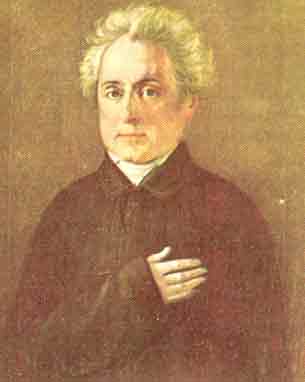People
Arts And Humanities
Dionisios Solomos (1798-1857)
Dionisios Solomos {Διονύσιος Σολωμός} (1798-1857) [20 Drachmas] [50 Drachmas] [Georgios I] [Kostis Palamas]. The Poet Laureate of Greece. In just one month, May of 1823, he wrote Greece's National Anthem, that is "Hymn To Liberty" {Imnos Eis Tin Eleftherian ~ Ύμνος Εις Την Ελευθερίαν} [The Hymn], which consists of 158 strophes.
The greatest modern Greek poet. Solomos was born on Zakinthos {Ζάκυνθος}, but shut his eyes on this life and crossed the threshold to eternity on Corfu {Kerkira ~ Κέρκυρα}, beset by bitterness and ill health. He was the son of Conte Nikolaos {Νικόλαος} Solomos and Angkeliki Nikli {Αγγελική Νίκλη}. He wrote his first poems in Italian, influenced by the people he had met while studying in Italy.
When Spiridon Trikoupis {Σπυρίδων Τρικούπης} heard him recite his poems, he advised him to write in Greek. Solomos then started studying the language he had learnt from his mother but which he had half forgotten. He studied folk songs and started to write verses in Greek. His early lyrical songs were fresh, simple, genuinely lyrical and moving, and had idyllic grace.
While in his friend Stranis' {Στράνης} headland mansion he heard the guns at Mesolongki {Μεσολόγγι} and shuddered violently. Tears welled up in his eyes and he cried out: "Hold on, poor Mesolongki. Hold on!". With the sound of the guns in the background and "with Greece locked in his soul", he sensed the Greatness and composed his "Hymn to Liberty".
Set to music by his musician friend Nikolaos Mandjaros [People], it was later to become the Greek National Anthem. This poem impressed with its wealth of epic imagery, its noble meaning, its imagination, power and warmth.
After his death everybody expected some great work to be discovered. But all that was found was fragments, drafts, notes and a few unconnected lines. The craving for perfection which had tormented him all his life had led this worthy lyrical poet to work the same pieces again and again without ever finishing them. Yet even so, his work is marked by simple grandeur and superb brilliance.
Dionisios Solomos (1798-1857)

04-22-2004